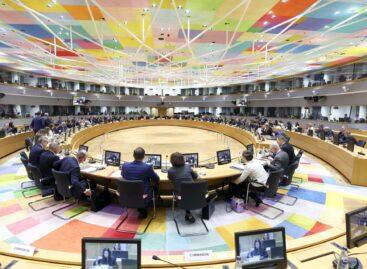Interest subsidy programs help thousands of farmers
Interest subsidy programs that provide significant budget resources provide financing available to thousands of farmers, said the Secretary of State for Agriculture and Rural Development of the Ministry of Agriculture in Budapest on Tuesday.

(Photo: AM/Tibor Vermes)
Zsolt Feldman stated: the role of all financing instruments in agriculture has increased, today in Hungary, 14.6 percent of the total economic loan portfolio is related to agriculture and the food industry. Thus, agriculture is also a significant item from the financiers’ side, he added. In the third quarter of 2023, the credit portfolio of agriculture was close to HUF 1,050 billion, 69 percent of which was interest-subsidized or discounted construction, he explained.
Of the loan stock, cooperative enterprises accounted for HUF 670 billion, and individual farms accounted for HUF 377 billion
According to the information of the state secretary, investment loans are dominant for individual farms, with 60 percent of the loan portfolio related to arable crop cultivation. Among social enterprises, the most typical is the loan stock related to animal husbandry, with 42.7 percent, and 36.8 percent for arable crop cultivation. Zsolt Feldman spoke about the Agrár Széchenyi Card Max+ scheme, launched last year under the auspices of the Ministry of National Economy, which is available to all producers with a five percent interest rate up to a loan amount of one hundred million forints. So far, 4,500 requests have been received for this, totaling HUF 112 billion, of which 2,950 producers already have concluded credit agreements worth HUF 75 billion. On average, farmers get a loan of HUF 25 million. He added: in the Agrár Széchenyi Investment Loan scheme, 610 investment loans have already been granted in an amount exceeding HUF 31 billion. Zsolt Feldman also indicated that since October 2023, 152,000 farmers have received HUF 422 billion in connection with the unified applications submitted by agricultural producers. In addition to ensuring liquidity, the state secretary called it important to support developments and efficiency-enhancing investments. To this end, this year they will enable unsecured advance financing for investments up to a maximum of 25 percent of the subsidy. They are also working to make the cost of the guarantee fee, as well as the interest cost up to ten percent, accountable for each investment – in addition to financing them with a support intensity of 50 percent – said the politician.
András Herczegh, the managing director of the Agricultural Business Credit Guarantee Foundation (AVHGA), emphasized: the role of financing instruments is appreciated in a difficult situation
However, in the provision of credit resources at a time when both banks and borrowers are cautious, the loan guarantee is of particular importance. He said: currently, around 21,000 farmers are under active guarantee, the loan portfolio involved exceeds HUF 600 billion. According to his information, the amount of liquidity loans increased last year, especially among plant growers, from 59 billion to 129 billion in 2022, while the amount of loans issued in animal husbandry increased from 35 to 50 billion. Last year, investment loans of HUF 76 billion were supported, which included land purchases, real estate renovations, and machine purchases, he said. According to András Herczegh, agricultural enterprises, especially plant growers, have been excellent debtors in the last ten years.
MTI
Related news
Not a turnaround, but consolidation: an agricultural outlook for 2026
🎧 Hallgasd a cikket: Lejátszás Szünet Folytatás Leállítás Nyelv: Auto…
Read more >Ministry of Agriculture: the government is supporting the development of crop dryers with significant resources
🎧 Hallgasd a cikket: Lejátszás Szünet Folytatás Leállítás Nyelv: Auto…
Read more >Related news
New country director at the helm of JYSK Hungary
🎧 Hallgasd a cikket: Lejátszás Szünet Folytatás Leállítás Nyelv: Auto…
Read more >









